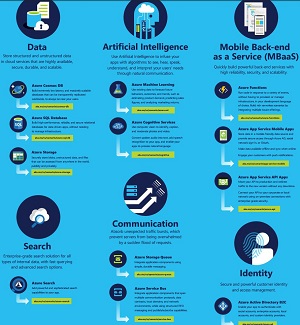News
One-Stop Guidance for Using Azure Cloud Services with Xamarin
If you're building mobile apps with Xamarin in Visual Studio, myriad Azure cloud services are available to provide ancillary services, ranging from plain old search to cutting-edge artificial intelligence (AI) in the form of machine learning and other cognitive services.
Microsoft has published one-stop guidance for sorting out these cloud services available for mobile app development projects -- in the form of a poster.
 [Click on image for larger view.] Mobile Apps Using Xamarin + Azure (source: Microsoft).
[Click on image for larger view.] Mobile Apps Using Xamarin + Azure (source: Microsoft).
"When talking about app development today, the cloud is almost always part of the conversation," the Visual Studio Engineering Team said in a Feb. 21 blog post. "While many developers have an idea of the benefits that cloud can offer them -- scalability, ready-to-use functionality, and security, to name a few -- it's sometimes hard to figure out where to start for the specific scenario you have in mind."
To simplify the process of investigating what Azure services are best suited for mobile app support, Microsoft published the guidance as a PDF infographic titled "Mobile apps using Xamarin + Azure."
In addition to standard Mobile-Backend-as-a-Service (MBaaS) functionality available in most cloud platforms, the poster outlines various options for providing data storage, AI, search, communication and identity services.
In total, a dozen services are described, with links to their respective sites.
"This poster serves as your one-stop guide to the most relevant cloud services that Azure has to offer to you as a mobile developer with Visual Studio and Xamarin," the team said.
About the Author
David Ramel is an editor and writer at Converge 360.